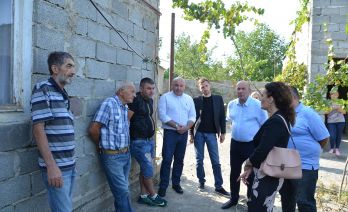- Public Information
- STRATEGIC DOCUMENTS
- NOTIFICATION FOR THE IMPLEMENTATION OF EMERGENCY HUMANITARIAN ASSISTANCE IN OCCUPIED TERRITORIES
- NOTIFICATION FOR INTERGOVERNMENTAL/DEVELOPMENT ORGANIZATIONS OPERATING IN OCCUPIED TERRITORIES
- NOTIFICATION FOR THE IMPLEMENTATION OF NON-EXEMPT ACTIVITIES IN OCCUPIED TERRITORIES OF GEORGIA
- NOTIFICATION ON ENTERING THE OCCUPIED TERRITORIES
- GENEVA INTERNATIONAL DISCUSSIONS
- INCIDENT PREVENTION AND RESPONSE MECHANISM (IPRM)
Three families affected by the barbed wire in Gugutiantkari will receive state aid
18 August 2019
 State Minister for Reconciliation and Civic Equality Ketevan Tsikhelashvili was in Gori, where she met with the families of Givi Razmadze and Lavrenti Gugutishvili, whose houses remained beyond the illegally affected barbed wire fence in the village of Gugutiantkari.
State Minister for Reconciliation and Civic Equality Ketevan Tsikhelashvili was in Gori, where she met with the families of Givi Razmadze and Lavrenti Gugutishvili, whose houses remained beyond the illegally affected barbed wire fence in the village of Gugutiantkari. The purpose of the State Minister's visit was to reiterate support on behalf of the Prime Minister and the Government, discuss the forms of assistance to affected families and steps planned by the State.
The families of Lavrenti Gugutishvili and Givi Razmadze will receive agricultural land from the state, which they can cultivate and use as they wish. They will also receive one-time cash assistance. Land and houses in Gori, where they live after the August 2008 war, will be legalized and they will become their owners. Members of families with health problems will be provided with the necessary medicines. They were also offered free vocational training.
The State will also support Amiran Gugutishvili's family, whose home is in the area, controlled by the Georgian Government, but still he has limited access to it. Amiran Gugutishvili's family will receive one-time social assistance.
“Today we were in Gori, in the families of Razmadze and Gugutishvili. In the place where they have been living since 2008, after August war and Russian intervention, when their houses in Gugutiantkari were bombed. I am here today in order to support them on behalf of the Government and to seek assistance in specific ways. This is about social assistance and legalization of the houses in which they live today. Also, about the opportunity to give them agricultural land in their village. This is their wish, and of course, the State will do its best to help.
“Our task, in general, is not only to stand next to these three families affected by the barbed wire process, but also the entire village, Gugutiantkari and all those villages that are near divided by the barbed wire. There are more than a hundred of such villages in Georgia. We will certainly continue the five-year program we are pursuing to address basic needs - water systems, gasification, education funding, construction of certain health facilities, infrastructure, etc. The most important is to create in these villages alternative opportunities of employment and income. In such way people will be able to stay in this land and we will be able give effective response to the occupation – by the doing business, development, better education and more opportunities. All these are necessary in order to beat these ugly barbed wires.
“Since 2013, we have begun funding the students from these villages and their number has actually tripled in the 2018-2019 school year. This means that the number of students in these villages has tripled. In turn, this is a very reliable indicator that families are staying on their own land and continue to live, despite these barbed wires. I think that the line of the peaceful anti-occupation front really pass’s right here. Our duty is to stand next to them”, - said Ketevan Tsikhelashvili.
The representatives of the local government, along with the State Minister, also visited Gugutishvili and Razmadze families.









